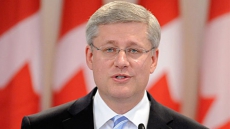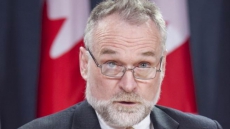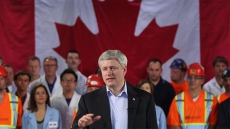TORONTO — Long reliant on paper-based patient files, the majority of Canadian doctors have now moved firmly into the 21st century, using electronic medical records and other forms of information technology to run their practices, a survey has found.
The 2014 National Physician Survey shows 75 per cent of doctors across the country report using electronic records to enter or retrieve clinical patient notes on a laptop or desktop computer, triple the percentage that had gone digital in 2007.
"I think physicians have wanted to be in the 21st century, but the reality is it's not a case of flipping a switch," said Dr. Garey Mazowita, president of the College of Family Physicians of Canada, which administers the survey with two other doctors groups.
"A physician who's had a long-standing paper-based practice, you have to face the challenge of scanning and digitizing what night be 2,000 charts, with pages and pages of information and entering the information into the correct field," said Mazowita, who practises in Vancouver. "And these are docs who are already working in excess of 50, often 60 hours a week."
"It's just inherently not an easy journey to make the transition."
Physicians in Alberta, British Columbia and Ontario were the most likely to use electronic records, while Quebec doctors were the least likely, the survey found.
About 65 per cent of physicians reported seeing better or much better quality of care since the implementation of electronic records, a rise of nine percentage points from a year ago.
The benefits most often cited were the ability to get lab results more quickly and to access a patient's chart remotely, as well as being alerted to potential medication warnings or adverse drug interactions.
Digital record-keeping and being connected electronically to hospitals and labs can now tell a family physician whether a patient has been to a walk-in clinic, seen a specialist or been admitted to or discharged from hospital — a system that didn't exist before.
"And now, particularly with the family doctors who are completely paper-free, really you've ideally got all of that information at your fingertips," Mazowita said.
Dr. Cindy Forbes, a family doctor in Fall River, N.S., has been using electronic medical records for about eight years, and said going digital has improved quality of care for her patients.
"There's much better access to patient information like test results, lab results," said Forbes, president-elect of the Canadian Medical Association (CMA). "You get them back much faster, so we can diagnose and treat patients much more quickly.
"I can't even tell you the difference it's made for me in regards to retrieval of information, legibility of information — if you're reading other doctors' notes. There was a time when I used to have to leaf through an inch or two of paper files to see what tests patients might have had or operations they may have had in the past. And now with a couple of clicks of the mouse, I can see their history back at least to the eight years I've had the computer app.
"So that is a huge difference."
Being digitally connected enables the family doctor, specialists and hospital physicians all to access a patient's medical records, thereby preventing duplications of tests and saving time and costs to the health-care system, she said. "There was a time when a test might have been repeated because they didn't have the results in front of them."
However, doctors in the survey also identified challenges in accessing information through a digital system: 52 per cent reported technical glitches, 46 per cent had issues with compatibility with other systems, and 26 per cent complained about firewall or security problems.
"There's this constant game of catch-up being played as the technology evolves," said Mazowita. "So the whole thing is a bit of a moving target, but we're definitely seeing movement forward."
More than 10,000 physicians responded to the online survey, which is also administered by the CMA and the Royal College of Physicians and Surgeons of Canada.





